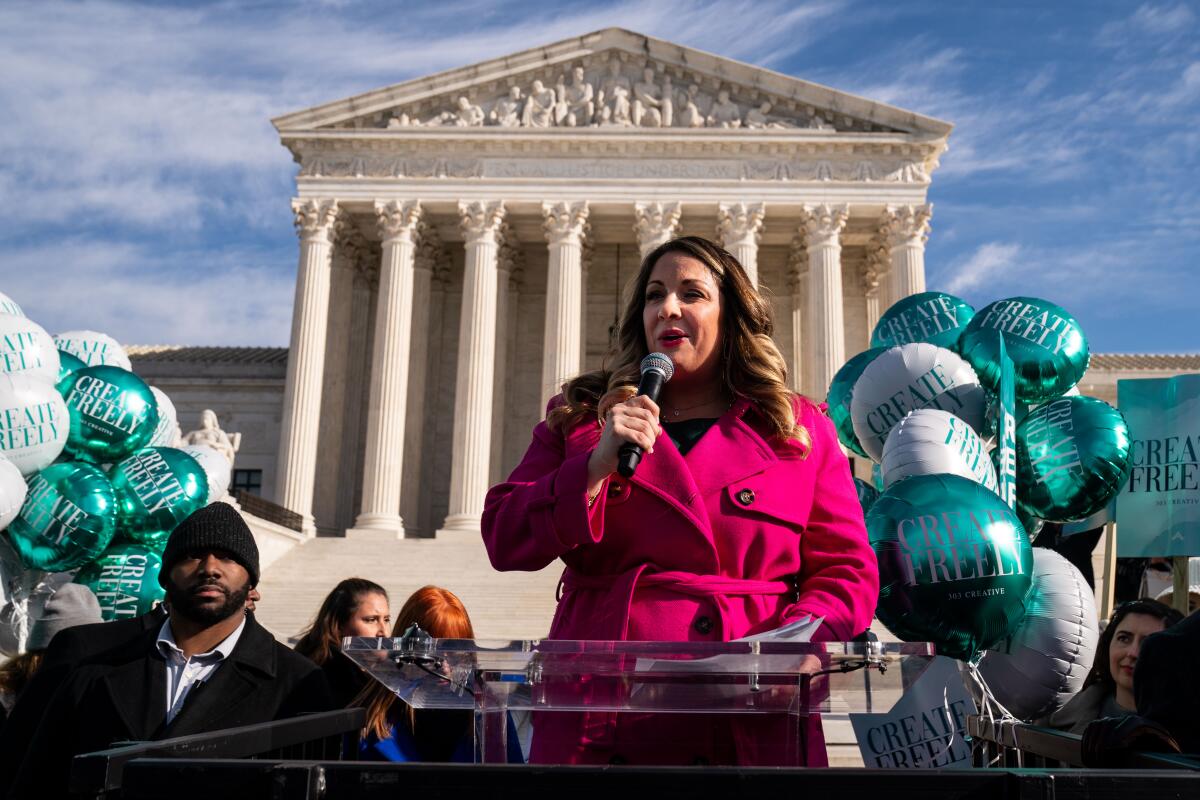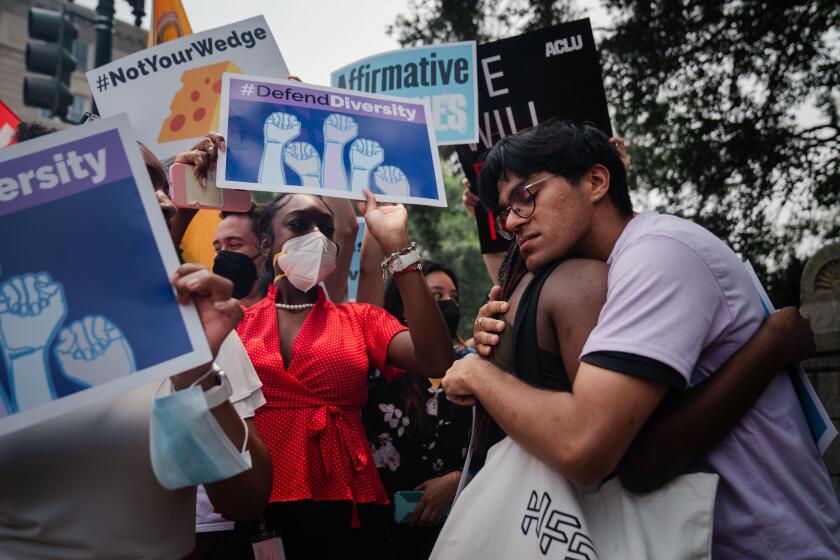Supreme Court rules Christian web designer can turn away business related to same-sex weddings

WASHINGTON — The Supreme Court ruled Friday that conservative Christians have a free-speech right to refuse to provide some business services for same-sex marriages, even in states like California where civil rights laws forbid discrimination based on sexual orientation.
The justices by a 6-3 vote sided with a graphic artist in Colorado who said she wants to expand her business to design custom websites that celebrate impending marriages, but not for same-sex couples. She cited her belief as a Christian that marriage is limited to a man and a woman.
“The 1st Amendment prohibits Colorado from forcing a website designer to create expressive designs speaking messages with which the designer disagrees,” Justice Neil M. Gorsuch wrote in the majority opinion.
In another major reversal, the Supreme Court forbids the use of race as an admissions factor at colleges and universities.
Lorie Smith, the graphic artist, sued Colorado in federal court and sought a 1st Amendment ruling that would protect her freedom of speech which — her attorneys noted — included the right not to speak.
In ruling for her in the case of 303 Creative vs. Elenis, the high court said the Constitution’s protection for free expression outweighs the state’s authority to require that businesses open to the public provide equal service to all.
The court’s six conservatives, all of them Republican appointees, were in the majority and the three liberals appointed by Democrats were in dissent.
Justice Sonia Sotomayor said in her dissent that “the court, for the first time in its history, grants a business open to the public a constitutional right to refuse to serve members of a protected class.”
But the ruling was limited to matters of speech and expression, and it does not appear to create a broad right for businesses or stores to discriminate based on sexual orientation.
President Biden expressed disappointment on Friday, saying he feared it would lead to increased discrimination.
“In America, no person should face discrimination simply because of who they are or who they love,” Biden said in a statement. “While the court’s decision only addresses expressive original designs, I’m deeply concerned that the decision could invite more discrimination against LGBTQI+ Americans.”
The court’s opinion does not affect its 2015 ruling that same-sex couples have a constitutional right to marry and to have their unions treated equally under the law.
It does, however, create an exception to that principle of equal rights. It permits some business owners to turn away same-sex couples if the service or product at issue involves speech or creative expression that celebrates their marriage.
Lambda Legal in Los Angeles condemned the ruling as “misguided” but “narrow.”
“Unlike yesterday’s affirmative action travesty, today’s smug attack on civil rights law will have limited practical impact in the marketplace because few commercial services involve original artwork and pure speech offered as limited commission,” said Jennifer C. Pizer, Lambda’s chief legal officer.
The web designer’s business is “unlike most commercial enterprises that solicit customers widely,” she said.
Mary Bonauto, a Boston-based attorney for the LGBTQ+ advocacy nonprofit GLAAD, agreed the case involved a “highly fact-specific decision authorizing a narrow exception to a state nondiscrimination law.”
While the ruling “is extremely limited, we are disappointed to see for the first time, and in the context of LGBTQ+ people who are already facing a heartbreaking backlash to the movement for liberty and equality for gender and sexual minorities, an unprecedented exemption to nondiscrimination laws,” she said.
California Atty. Gen. Rob Bonta said the state’s “unwavering support for the LGBTQ+ community remains steadfast even in the face of today’s disheartening decision. While this ruling is a setback, we will continue and redouble our pursuit of equality for all.”
The ruling is a victory for conservative Christians and the Arizona-based Alliance Defending Freedom, which has repeatedly gone to court on behalf of wedding photographers, cake makers, florists and other “artists” who said it would violate their religious beliefs and their right to free expression to be required to participate — even indirectly — in a same-sex marriage.
Eric Rassbach, senior counsel for the Becket Fund for Religious Liberty, saw a benefit. “Religion and work are not at odds. Yesterday, the court protected religious workers in secular workplaces, and today the court protected religious business owners. That is good news for religious Americans of all stripes,” he said.
He referred to a unanimous ruling Thursday in which the court said federal law requires employers to give workers time off for the Sabbath or religious holidays unless doing so would result “in substantial increased costs” for the business.
But the court did not rule for the Christian postal worker in the case of Groff vs. DeJoy. It sent his case back to be reconsidered by a lower court.
In Friday’s ruling in the case of the web designer, Gorsuch focused entirely on the freedom of speech protected by the 1st Amendment, not the free exercise of religion.
“In this case, Colorado seeks to force an individual to speak in ways that align with its views but defy her conscience about a matter of major significance,” he wrote. “Of course, abiding the Constitution’s commitment to the freedom of speech means all of us will encounter ideas we consider ‘unattractive,’ ‘misguided or even hurtful.’ But tolerance, not coercion, is our nation’s answer.”
More to Read
Get the L.A. Times Politics newsletter
Deeply reported insights into legislation, politics and policy from Sacramento, Washington and beyond. In your inbox three times per week.
You may occasionally receive promotional content from the Los Angeles Times.












